Equilar Institute
Reports
CFOs on Boards: Higher Pay, Lower Performance
August 23, 2017
A top corporate executive serving on another company’s board of directors may provide strategic advantages for both the executive and the company. With the additional perspective gained from unique sets of issues faced by another company, he or she may bring back valuable insights that can help improve strategy and operations. In addition, for the executives themselves, serving on another company’s board can be a valuable professional development opportunity, to the point that some are actively seeking board positions for their top executives to aid their succession planning programs.
It’s well known that CEOs of public companies frequently serve on other boards of directors, to the point that investor advisors have made explicit guidelines about the appropriate commitment to other boards from these individuals. Beyond the CEO however, there is far less research into how many top executives in other positions are on outside boards of directors. Equilar recently undertook a study of CFOs at large-cap companies over the past three years to identify how many also serve on other public company boards of directors.
The study had two key findings:
-
CFOs that served on boards of directors outside their own company were awarded higher pay than their counterparts in the most recent fiscal year, and the gap was much wider among those who served on two or more outside boards.
-
Companies with CFOs serving on outside boards saw lower performance when it came to total shareholder return (TSR), revenue and net income, which was amplified for companies where CFOs served on two or more outside boards.
It’s important to note that pay and performance in this study represent correlations, not causation. A fair portion of executive pay is forward-looking, in the sense that what is reported to the SEC includes stock and options grants at fair market value on the date they were granted. As a result, if a CFO was awarded a $5 million stock grant in the most recent fiscal year meant to pay out based on performance over a three-year period, the results of backward-looking performance outcomes would not correlate directly to the most recent year’s pay package.
Nonetheless, the study represents an analysis of CFOs who have served their companies for three consecutive years, whether or not they were on another board of directors, and notes differences in pay and performance for those groups of executives. The findings raise important questions for investors and companies when evaluating executive board commitments.
Nearly One-Third of CFOs Served on Outside Boards
The Equilar study analyzed 289 large-cap companies that had CFOs or other principal financial officers who served in that position for the three most recent fiscal years consecutively. Among those, 94 executives also served on at least one other board as of their most recent fiscal year end, while 195 did not. The list of companies from which the sample set for the study was derived can be found here.
A majority of CFOs serving as directors were on just one outside board, or 78 of the total 94. This count includes four CFOs who served on their own company’s board as well as one outside board. Fourteen CFOs served on exactly two outside boards, and two directors served on three outside boards.
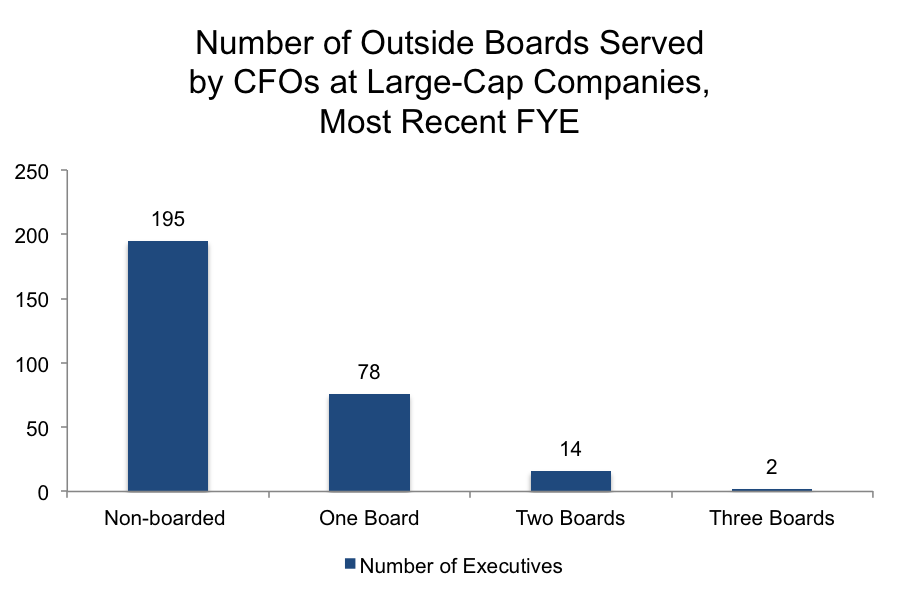
CFO Pay Was Higher for Boarded Directors
Pay for CFOs in each camp overall was relatively even, though slightly higher for those directors who also served on outside boards. The 94 boarded directors were awarded a median $4.0 million in their most recent fiscal year, vs. $3.9 million for the non-boarded directors—a slight difference of about $75,000.
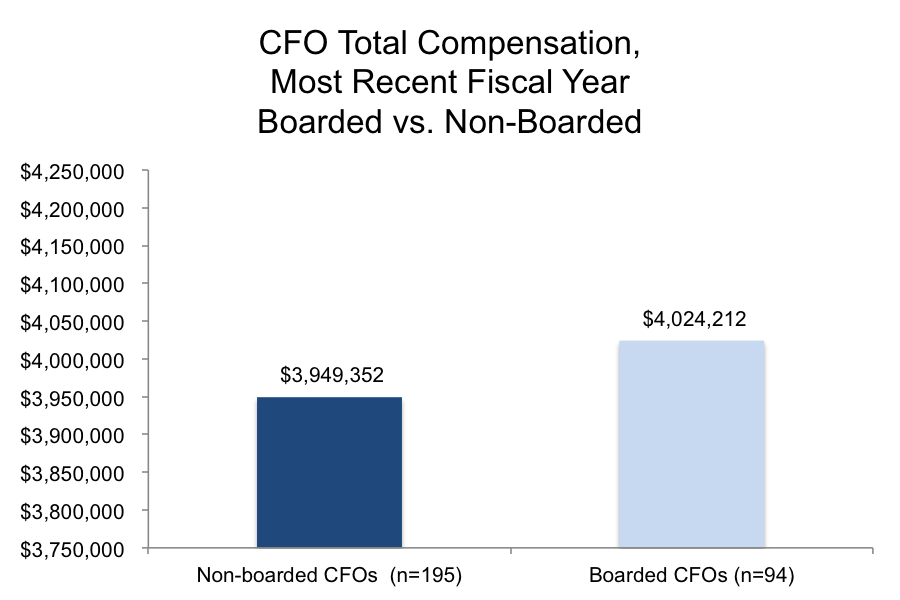
When breaking down the boarded CFOs by the number of seats they occupied, the pay gap widened noticeably. CFOs that also served on two or more boards were awarded a median $5.4 million in the most recent fiscal year, vs. just under $4 million for those directors who served one other board.
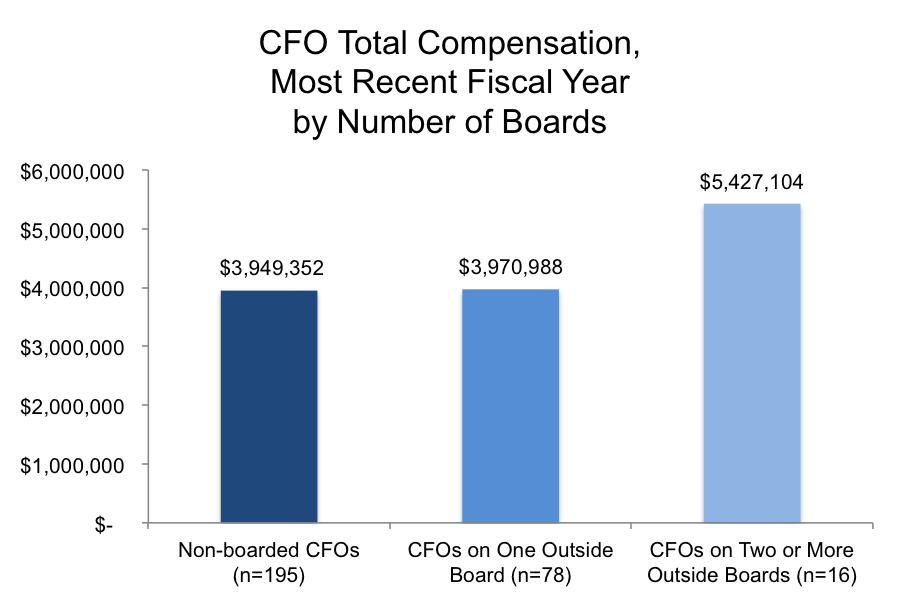
Companies With CFOs on Outside Boards Underperformed Their Counterparts
The pay gap between CFOs that served on multiple boards is notable because median performance outcomes for those 16 companies was lower than all other companies in the study according to three key metrics—total shareholder return (both one-year and three-year), revenue, and net income.
For the most recent three fiscal years, median three-year TSR for companies with non-boarded CFOs was 10.4%, compared to 10.0% for the companies that had a CFO serving an outside board. Looking just at data from the most recent year, the study revealed more stark contrasts. One-year TSR for the non-boarded CFO companies was 15.6%, while companies with CFOs on other boards saw a one-year TSR of 10.2%.
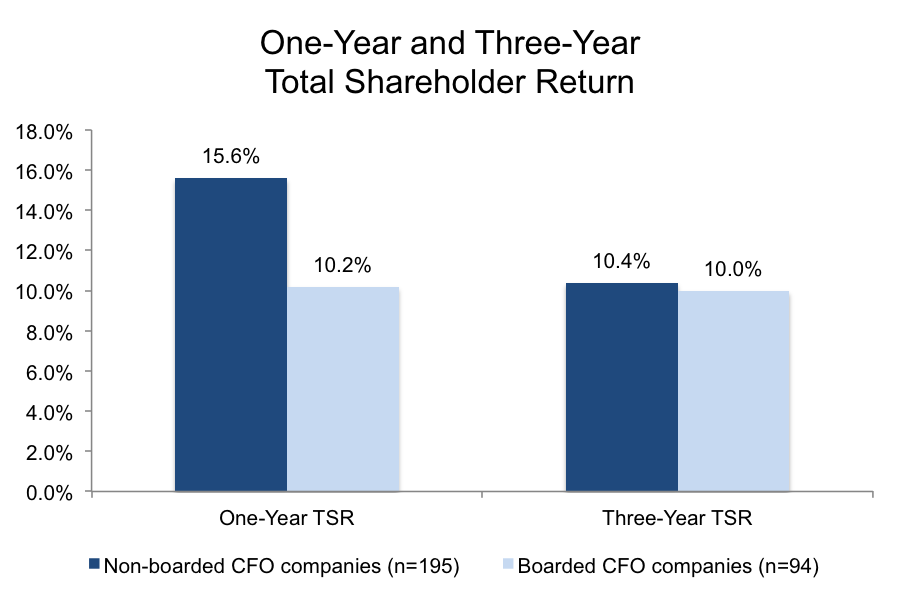
The results are more nuanced when breaking down company performance by the number of board seats their CFOs occupied. While median one-year TSR was slightly higher for companies with a CFO serving one outside board (10.2%) compared to two or more (9.3%)—still well below one-year return for the non-boarded companies—three-year median TSR was the highest for companies where the CFO was on one outside board. The 16 companies with CFOs sitting on at least two outside boards saw a comparatively paltry 3.3% total shareholder return over the study period.
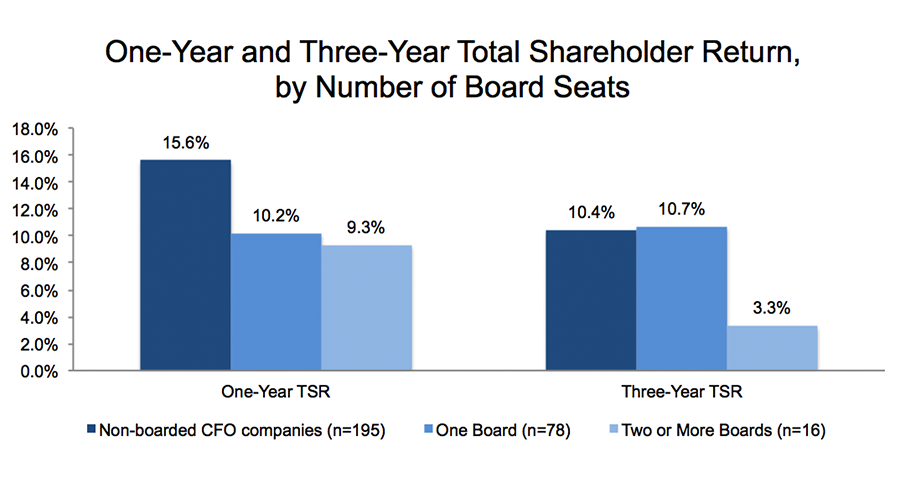
Furthermore, revenue and net income were lower for the companies that had CFOs on outside boards as well. Median revenue overall for companies with CFOs that served on any outside boards was $8.8 billion, and median net income for those companies was $661.3 million in fiscal year 2016. Meanwhile, median revenue for companies whose CFOs did not serve on a board was $9.5 billion and median net income was $816.3 million.
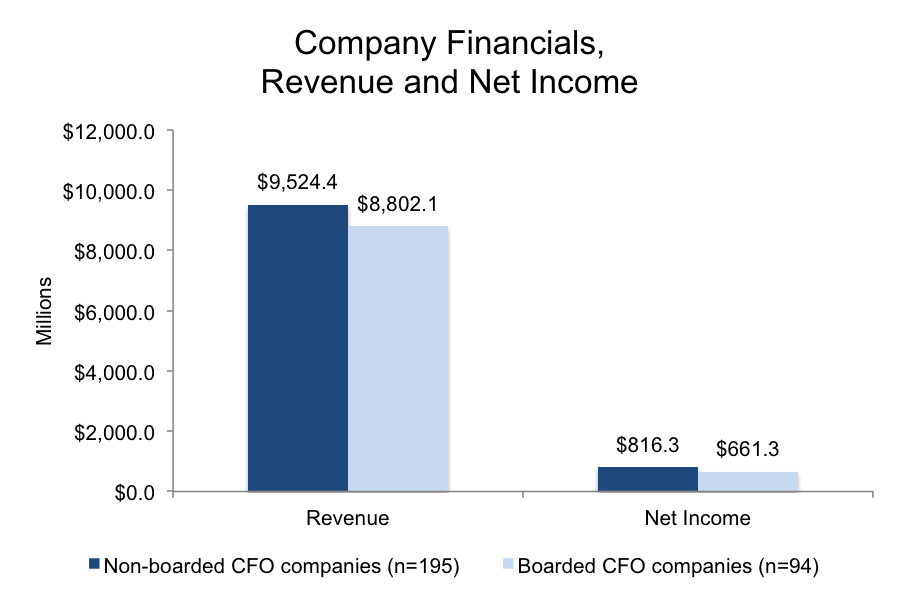
Unlike TSR, financial metrics followed a clear digressive pattern for both revenue and net income as CFOs sat on more outside boards. The companies with CFOs serving on one other board saw median revenue of $8.9 billion and net income of $661.3 million, while those with CFOs on two or more boards had median annual revenue of $7.3 billion in fiscal year 2016, and median net income of $621.5 million.
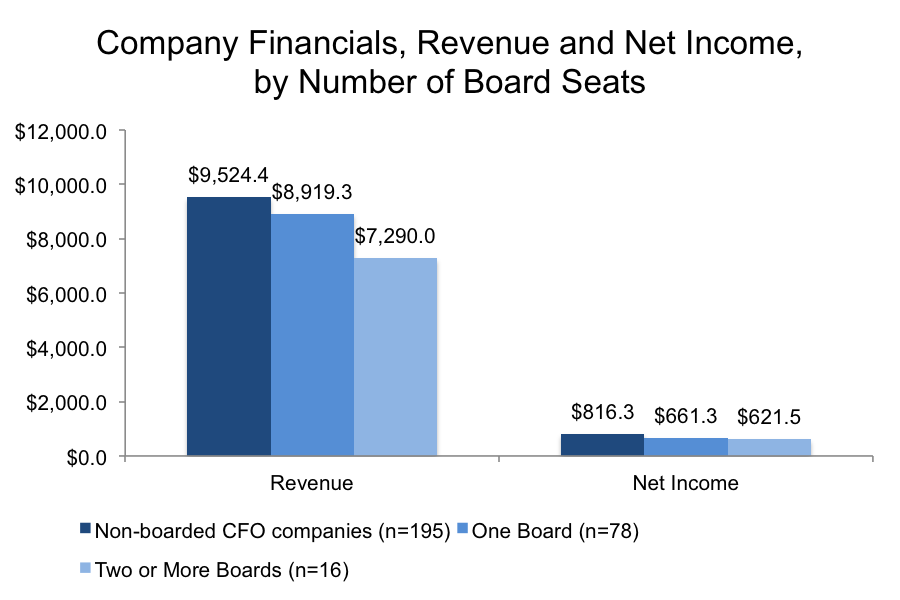
Shareholder Scrutiny on Multi-Boarded Executives
To reiterate, these pay and performance figures are correlations, not necessarily causation, neither to each other nor to board service of any individual CFO. But they beg the question whether a company’s CFO joining an outside board—particularly multiple outside boards—has the same quantitative benefits as the new perspectives and additional insights he or she may qualitatively bring to a company’s C-suite by serving as a director.
The time commitment required to serve boards of directors at public companies continues to increase, and the degree with which board members must be prepared to manage complex and disparate issues has intensified. While any individual CFO may have unique circumstances and capabilities that allows the time and effort to serve multiple boards and his or her company as a top executive, shareholder and proxy advisor scrutiny on the number of outside boards sitting executives should serve will continue to be a point of contention.
Amit Batish, Content Manager at Equilar, authored this report.
Alice Lee, research manager, contributed research and analysis.
For information regarding the studies referenced in this post and to purchase the underlying datasets, or to learn more about Equilar Research Services, please contact the Equilar research team at researchservices@equilar.com.
Please contact abatish@equilar.com for more information on Equilar content and data analysis.
 Solutions
Solutions
















